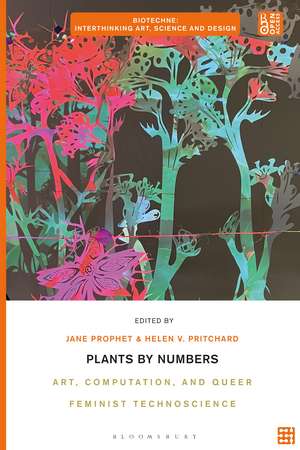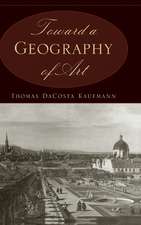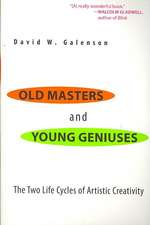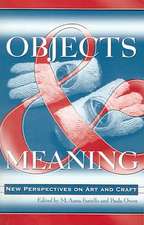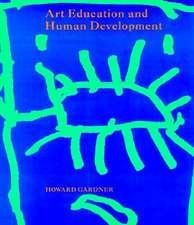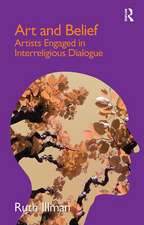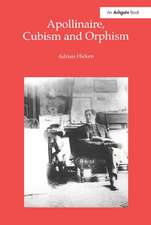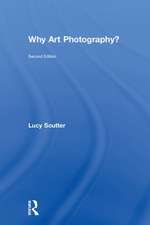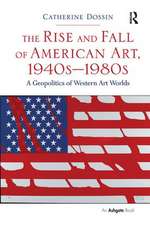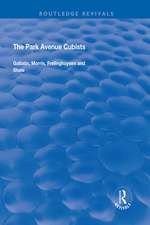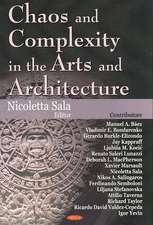Plants by Numbers: Art, Computation, and Queer Feminist Technoscience: Biotechne: Interthinking Art, Science and Design
Editat de Dr. Jane Prophet, Dr. Helen V. Pritcharden Limba Engleză Hardback – 15 noi 2023
Preț: 545.28 lei
Preț vechi: 776.92 lei
-30% Nou
Puncte Express: 818
Preț estimativ în valută:
104.34€ • 113.69$ • 87.92£
104.34€ • 113.69$ • 87.92£
Carte disponibilă
Livrare economică 02-16 aprilie
Preluare comenzi: 021 569.72.76
Specificații
ISBN-13: 9781350343252
ISBN-10: 1350343250
Pagini: 288
Ilustrații: 43 colour and 66 bw illus
Dimensiuni: 156 x 234 x 25 mm
Greutate: 0.82 kg
Editura: Bloomsbury Publishing
Colecția Bloomsbury Visual Arts
Seria Biotechne: Interthinking Art, Science and Design
Locul publicării:London, United Kingdom
ISBN-10: 1350343250
Pagini: 288
Ilustrații: 43 colour and 66 bw illus
Dimensiuni: 156 x 234 x 25 mm
Greutate: 0.82 kg
Editura: Bloomsbury Publishing
Colecția Bloomsbury Visual Arts
Seria Biotechne: Interthinking Art, Science and Design
Locul publicării:London, United Kingdom
Caracteristici
Expands current debates in the fields of visual culture, computational aesthetics, human geography, gender and queer studies, computing, and software studies
Notă biografică
Jane Prophet is an artist and Professor at Stamps School of Art and Design, University of Michigan, USA. She works across media and disciplines to produce apps, objects and installations, frequently combining traditional and computational media. Prophet's papers position art in relation to contemporary debates about art, feminist technoscience, artificial life and ubiquitous computing.Helen V. Pritchard is Professor of Research at Basel Academy of Art and Design, University of Applied Sciences and Arts Northwestern Switzerland (FHNW). They are the co-editor of Data Browser 06: Executing Practices (2018) and the special issue of Science, Technology and Human Values "Sensors and Sensing Practices" (2019). They organise with The Institute of Technology in the Public Interest.
Cuprins
AcknowledgementsList of Contributors List of Plates List of Figures Introduction Part One: Techno-nature entanglements 1. Afro-now-ist Stories of Resistance: A Conversation with Stephanie Dinkins, Stephanie Dinkins (Stony Brook University, USA) and Srimoyee Mitra (University of Michigan, USA) 2. The Compromised/Compromising Life of a Farmed Plant, Elaine Gan (Wesleyan University, USA) 3. As Children of Plants, we Play in our Machine Gardens, Amy Youngs (Ohio State University, USA) 4. Co-operating with Diatoms - queer fabulations of a world feeling computing, Helen V. Pritchard (HGK-FHNW University of Applied Sciences and Arts Northwestern Switzerland) 5. So-called Plants, Possible Bodies, Jara Rocha and Femke Snelting (Interdependent researchers, Barcelona and Brussels) Part Two: Plants - resistance, regeneration and alliance 6. Forests that Compute, Jennifer Gabrys (University of Cambridge, UK) 7. Watered by Data and Other Bio-economic Thoughts: A Conversation Between Curator Belinda Kwan and Artist Stephanie Rothenberg, Belinda Kwan (Independent curator, Canada) and Stephanie Rothenberg (SUNY Buffalo, USA) 8. Tending to 2030m3: How to regenerate regeneration? How to unasphalt asphalt?, Helen V. Pritchard (HGK-FHNW University of Applied Sciences and Arts Northwestern Switzerland), Eric Snodgrass (Linnaeus University/Linköping, Sweden) Miranda Moss (Artist, South Africa), Daniel Gustafsson (Linnaeus University, Sweden 9. Decolonization, Computation, Propagation: Phyto-human alliances in the pathways towards generative justice, Ron Eglash, Audrey Bennett, Lionel Robert, Kwame Porter Robinson, Matthew Garvin, Mark Guzdial (all, University of Michigan, USA) Part Three: Becoming-with-plants 10. Codely Phytographia: an artist's material history of writing code with trees, Jane Prophet (University of Michigan, USA) 11. Tehran of Trees, Sina Seifee (Artist, Belgium/Iran) 12. Writing in the Wind: Ecopoetics and geoengineering, Joel Ong (York University, Canada) 13. Sunbot Swarm: Absurdist Cyborg Systems for House Plants, Kathleen McDermott (NYU Tandon, USA) 14. Yellow Furry Lullaby, Breakwater, Youngsook Choi and Taey Iohe (Artists, UK/Korea) GlossaryIndex
Recenzii
A text that demonstrates the vital importance of observing and treating plants as our companion species, and as cohabitants of this planet to bend towards and learn from, as we ponder our own significance and survival, threatening the end of the anthropocene.
Plants by Numbers works through how coloniality shapes, but does not absolutely envelop, our queerly inter-human and inter-ecological worlds. Rethinking classificatory taxonomies, the book centres plant-life and its aesthetic-scientific possibilities in an eloquent intervention into studies of livingness, affect, and relationality.
This timely collection of accounts by artists, curators, technoscientists and theorists speculates on different modes of world-making and creating kinship with plants, establishing a rich ground for more-than human entanglements.
Growing from a simple prompt, to consider numbering-otherwise, this volume brings together artistic, academic and community-building studies and productions of co-constitutive life worlds of plants and soil, computation and simulation, humans and more-than-humans. Rooted in anti-colonial, Black and Indigenous, trans-feminist and queer science and technology studies and poetics, shifting away from numbering as a method of control, and generously reimagining accounts, plots and digging as critical cultivating methods and creative practices, Plants By Numbers is essential reading (and experiencing) for artists, scholars, organizers, gardeners, farmers, teachers, observers, dreamers and anyone moved by the transformational and technocultural worlding of entangled plant lives.
In our data-driven world, this collection asks how we might articulate an ethico-politics of numbers with respect to the more-than-human world. Respect is key here, for the power of enumeration but also for its limits, and for the irreducible relationality of sustainable world-making.
Plants by Numbers works through how coloniality shapes, but does not absolutely envelop, our queerly inter-human and inter-ecological worlds. Rethinking classificatory taxonomies, the book centres plant-life and its aesthetic-scientific possibilities in an eloquent intervention into studies of livingness, affect, and relationality.
This timely collection of accounts by artists, curators, technoscientists and theorists speculates on different modes of world-making and creating kinship with plants, establishing a rich ground for more-than human entanglements.
Growing from a simple prompt, to consider numbering-otherwise, this volume brings together artistic, academic and community-building studies and productions of co-constitutive life worlds of plants and soil, computation and simulation, humans and more-than-humans. Rooted in anti-colonial, Black and Indigenous, trans-feminist and queer science and technology studies and poetics, shifting away from numbering as a method of control, and generously reimagining accounts, plots and digging as critical cultivating methods and creative practices, Plants By Numbers is essential reading (and experiencing) for artists, scholars, organizers, gardeners, farmers, teachers, observers, dreamers and anyone moved by the transformational and technocultural worlding of entangled plant lives.
In our data-driven world, this collection asks how we might articulate an ethico-politics of numbers with respect to the more-than-human world. Respect is key here, for the power of enumeration but also for its limits, and for the irreducible relationality of sustainable world-making.
